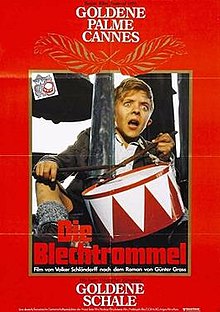
Back طبل الصفيح (فيلم) Arabic الطبل المعدنى ARZ تنکه ترامپت (فیلم) AZB Тенекиеният барабан (филм) Bulgarian El timbal de llauna Catalan Plechový bubínek (film) Czech Die Blechtrommel CY Bliktrommen (film) Danish Die Blechtrommel (Film) German Το Ταμπούρλο Greek
| The Tin Drum | |
|---|---|
 Original German film poster | |
| German | Die Blechtrommel |
| Directed by | Volker Schlöndorff |
| Written by | Jean-Claude Carrière Franz Seitz Volker Schlöndorff |
| Based on | The Tin Drum by Günter Grass |
| Produced by | Franz Seitz |
| Starring | David Bennent Mario Adorf Angela Winkler Katharina Thalbach Daniel Olbrychski Charles Aznavour |
| Cinematography | Igor Luther |
| Edited by | Suzanne Baron |
| Music by | Maurice Jarre |
Production companies |
|
| Distributed by | United Artists |
Release dates |
|
Running time | 142 minutes 162 minutes (Director's cut) |
| Countries | West Germany France Yugoslavia Poland |
| Language | German |
| Budget | $3 million[1] |
| Box office | $13 million (Germany – 25 million Marks)[2] $2 million[3] or $4 million[4] (U.S.) |
The Tin Drum (German: Die Blechtrommel) is a 1979 internationally co-produced magical realistic dark comedy anti-war film adaptation of Günter Grass's novel of the same name, directed by Volker Schlöndorff from a screenplay co-written by Schlöndorff, Jean-Claude Carrière, and Franz Seitz. It stars Mario Adorf, Angela Winkler, Katharina Thalbach, Daniel Olbrychski, and Charles Aznavour, with David Bennent in the lead role of Oskar Matzerath, a young boy who willfully arrests his own physical development and remains in the body of a child even as he enters adulthood.
A darkly comic war drama with magical realist elements, the film follows Oskar, a precocious child living in Danzig, who wields seemingly preternatural abilities. He lives in contempt of the adults around him and witnesses firsthand their potential for cruelty, first via the rise of the Nazi Party and then the subsequent war. The title refers to Oskar's toy drum, which he loudly plays whenever he is displeased or upset. The German-language film was a co-production of West German, French, and Yugoslavian companies.
The film won the Palme d'Or at the 1979 Cannes Film Festival and was a major financial success in West Germany, where it won the German Film Award for Best Fiction Film. It was received more controversially internationally, and was targeted by censorship campaigns in Ireland, Canada, and the United States. Despite the notoriety, the film won Best Foreign Language Film at the 1980 Academy Awards. In 2003, The New York Times placed the film on its Best 1000 Movies Ever list.[5]
- ^ Guild, Hazel (12 April 1978). "German Film Production Perks; Lotsa Projects Poised To Roll". Variety. p. 63.
- ^ Gould, Hazel (9 January 1980). "1979 total for 'The Tin Drum' More Than All '78 German Pix". Variety. p. 12.
- ^ Donahue, Suzanne Mary (1987). American film distribution : the changing marketplace. UMI Research Press. p. 295. ISBN 978-0-8357-1776-2. Please note figures are for rentals in US and Canada
- ^ "Pix from afar: National bests in the U.S.". Variety. 7 January 1991. p. 86.
- ^ Cite error: The named reference
:0was invoked but never defined (see the help page).